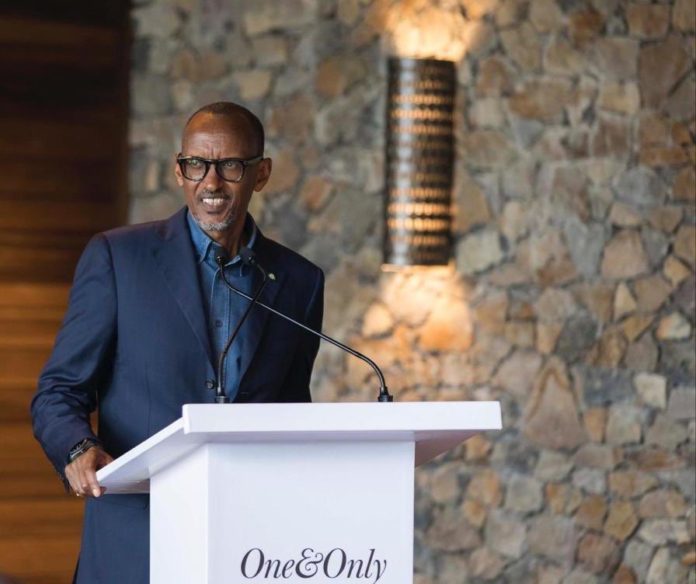By Katrina Lantos Swett
As I write this, Paul Rusesabagina, the real-life hero of the Oscar-nominated film “Hotel Rwanda,” has been unjustly imprisoned in Kigali, Rwanda, for more than 280 days. In all that time, the administrations of two American presidents have failed to make so much as a statement in support of this humanitarian, who also happens to be a U.S. Permanent Resident and a recipient of the Presidential Medal of Freedom.
Rusesabagina, an outspoken critic of Rwandan President Paul Kagame, had no intention of going back to his native country. He publicly stated on several occasions that he could not return for fear of retribution. Nevertheless, that is where he found himself last August, when an associate secretly working with the Rwandan government tricked him into getting on a private jet he thought was bound for Burundi. Instead, the plane landed in Kigali, Rusesabagina was held for three days incommunicado, and finally reappeared handcuffed and in the custody of the Rwanda Investigation Bureau (RIB).
This was a textbook case of enforced disappearance, a clear violation of Rusesabagina’s basic human rights and of the United Nations’ International Convention for the Protection of All Persons from Enforced Disappearance. Put in simpler terms, Rusesabagina was kidnapped.
These events prompted some outrage among human rights groups and certain lawmakers in the U.S. and Europe, as it well should. But the deafening silence from official government channels has drowned out the chorus of voices calling for action. And what has that silence enabled? More than just the continued abuse and imprisonment of a Belgian citizen and U.S. Permanent Resident, as in the case of Rusesabagina. It has created a template for other dictators and apparently has given them carte blanche to use increasingly audacious methods to capture and arrest their most vocal critics.
Consider what just happened in Belarus, where President Alexander Lukashenko used military jets to divert — some say hijack — a flight carrying 26-year-old dissident journalist Roman Proasevich, so that he could be arrested and thrown in jail. Only days after this incident, Russian President Vladimir Putin decided to try his own “airplane ploy” and had opposition leader Andrey Pivovarov hauled off an outgoing flight at St. Petersburg Airport.
The Belarusian event took place on May 23; in less than a week, the United States had raised its travel advisory for Belarus to a level 4, “Do not travel” warning and had announced forthcoming sanctions on Belarusian officials involved in the incident. All these actions were warranted and well justified. But it’s worth noting that it took no more than a few days for the U.S. to spring into action and censure Belarus on behalf of a Belarusian national; Rusesabagina, who renounced his Rwandan citizenship in 1996, has languished in prison for the better part of a year without any meaningful action from the countries he calls home.
The U.S. silence in the case of Paul Rusesabagina, and its unwillingness to call Rwanda to account for its human rights abuses, undoubtedly has much to do with the status of President Kagame as the so-called “darling tyrant.” Some hold him up as a paragon of democratic leadership, even against an ever-growing list of critics who have been forcibly disappeared, imprisoned or killed. But the time for timidity is over — we have seen its fruits in Belarus and Russia — and the U.S. no longer can afford to turn a blind eye to Rwanda’s crimes.
For this reason, the Lantos Foundation for Human Rights & Justice has filed a formal submission to the State Department and Department of Treasury urging Global Magnitsky sanctions to be imposed on two Rwandan officials reportedly complicit in Rusesabagina’s kidnapping: Justice Minister Johnston Busingye and head of the RIB, Col. Jeannot Ruhunga.
Proving culpability in human rights abuses, such as an enforced disappearance, can be challenging. But in this instance, the Rwandan officials named in the sanctions submission have made it surprisingly easy to prove their guilt. Busingye admitted during a televised interview that the Rwandan government paid for the private plane that took Rusesabagina from Dubai to Kigali. Ruhunga not only made public comments about the unilateral “operation” carried out by the RIB (after initially, and falsely, claiming that the arrest was made with international cooperation), but he also was named in the sworn affidavit of Rusesabagina’s jailhouse testimony as one of only two people who had contact with him in an unknown facility during the three days between the flight leaving Dubai and the public news conference announcing the arrest in Kigali.
Rusesabagina faces terrorism charges in a show trial that began in late January and is ongoing. I mention this almost in passing because the charges, which I believe to be trumped up by Kagame and his supporters, are immaterial to this indisputable fact: Paul Rusesabagina was brought to Rwanda illegally under international law. Any individual, government or organization that truly values human rights and the rule of law must recognize this fact and acknowledge that whatever follows Rusesabagina’s kidnapping — the charges or any eventual, predetermined, conviction — is simply fruit of the poisoned tree.
It is beyond time for the United States to stand up and lead on behalf of a man who once risked his own life to save more than 1,200 people amid the horror of the Rwandan genocide. It is beyond time to put President Kagame on notice that Rwanda’s free pass on human rights abuses has finally, and deservedly, expired. It is time to use targeted Magnitsky sanctions — one of the most potent and powerful tools for human rights — to hold accountable the men responsible for kidnapping Paul Rusesabagina.
Katrina Lantos Swett, Ph.D., J.D., is president of the Lantos Foundation for Human Rights & Justice. She is a human rights professor at Tufts University and the former chair of the U.S. Commission for International Religious Freedom. Follow her on Twitter @LantosSwettK.





























































